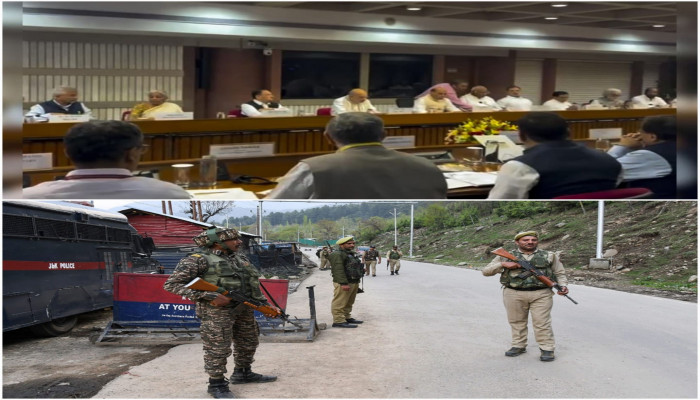Opposition supports government's measures against terror, but raise questions on Pahalgam security 'lapse'
- In Reports
- 03:41 PM, Apr 25, 2025
- Myind Staff
A day after India rolled out a series of steps against Pakistan following the Pahalgam terror attack, political leaders from across the spectrum expressed full support for the government's actions against those behind the attack and their backers. Meanwhile, several opposition leaders raised concerns, stating that the attack highlighted “lapses” in security and intelligence. During an all-party meeting on Thursday, the government briefed leaders on the current situation to build a united political front. While supporting the government's response, several Opposition leaders questioned why Prime Minister Narendra Modi was not present at the meeting and highlighted the need to address the shortcomings of security and intelligence.
Union Ministers Amit Shah, Rajnath Singh, Nirmala Sitharaman, and S. Jaishankar, all part of the Cabinet Committee on Security that decided on India’s response to Pakistan, attended the meeting and updated the leaders on the situation. During the meeting, several leaders, including Congress president and Rajya Sabha Opposition Leader Mallikarjun Kharge, Lok Sabha Opposition Leader Rahul Gandhi, TMC’s Sudip Bandyopadhyay, and AAP’s Sanjay Singh, raised concerns about security and intelligence failures.
"It was important that the Prime Minister attend such a meeting because the decisions he takes are final… and are of importance…they (the ministers) said they will brief him. I said briefing him is one thing, and he himself listening to our views and taking a decision is another,” Kharge stated after the meeting. “We also raised the issue of security lapses. How can such a lapse happen when a three-tier security system was in place? Rahul Gandhi asked how can 1000-odd people go there and the police do not have any knowledge,” he expressed.
During the meeting, Kharge described the incident as a “glaring mistake on the intelligence front and a security failure,” adding that the government failed to take “quick action.” He mentioned that an official at the meeting acknowledged a lapse and admitted that the incident still occurred despite their best efforts.
AAP’s Sanjay Singh informed The Indian Express: “The government told us that this spot (the attack site) used to open during the Amarnath Yatra and security would be tightened at that time. But it was opened on April 20 this time, and the security agencies were not informed about it. The place had been active without security since April 20. The Opposition pointed out that it was a huge security lapse.”
Supriya Sule of the NCP (SP) stated that even tour operators in Pune knew the area had been reopened for tourists.
Kharge said that there was complete agreement, stating, “Everybody, in one voice, said we will support the actions which will be taken by the government in the interest of the country… that we are together on this issue and we will fully support the government and cooperate with it so that a message goes out to the people of the country and outside that the country is united.” Gandhi echoed this, saying, “We uniformly condemned what happened and the Opposition has given complete support to the government in whatever actions it may take.”
Talking to reporters, Parliamentary Affairs Minister Kiren Rijiju mentioned that Rajnath Singh updated the meeting on the decisions made by the CCS. Singh, he added, reaffirmed the government’s zero-tolerance stance on terrorism and informed the leaders of plans to “take more strong actions.”
Rijiju mentioned that the meeting was briefed by officials from the Intelligence Bureau and the Home Ministry. “How the incident happened… the site where the incident happened is not on the main road… all the parties were told that sub kuch achha chalte huay bhi yeh ghatna ek chook hai… everybody is saddened… what all steps have been taken to ensure that such an incident does not happen again.”
Following the attack near Pahalgam, several top leaders from both the government and the opposition attended a high-level meeting. Home Minister Amit Shah, who had visited the attack site a day after the incident, was present along with Union Ministers Kiren Rijiju, Health Minister and BJP President J.P. Nadda.
Opposition leaders like Mallikarjun Kharge and Rahul Gandhi from the Congress also took part, along with floor leaders from various parties, including Ramgopal Yadav (SP), Sudip Bandyopadhyay (TMC), Tiruchi Siva (DMK), Sanjay Singh (AAP), Sasmit Patra (BJD), Prem Chand Gupta (RJD), Asaduddin Owaisi (AIMIM), and Supriya Sule (NCP-SP). NDA allies Shiv Sena and TDP were represented by Shrikant Shinde and Lavu Sri Krishna Devarayalu, respectively. The gathering signalled the government’s intention to present a united political front to respond to the attack. After the meeting, AAP’s Sanjay Singh said the leaders urged the government to take decisive action against the terrorists and hold Pakistan accountable for supporting them.
AIMIM leader Asaduddin Owaisi called for decisive action against Pakistan, referencing United Nations Security Council Resolution 1373. This resolution requires all UN member states to take steps to fight terrorism, including criminalising the funding of terrorism, freezing terrorist assets, and cooperating in investigations. Owaisi accused Pakistan of repeatedly violating this resolution. He also referred to Article 51 of the UN Charter, which grants countries the right to self-defence if attacked, urging the government to act on this right.
Owaisi called for an end to the “false propaganda” against Kashmiris, including students, on social media. He expressed, “Muslims have nothing to do with it (the attack) and will never be. We agree that these terrorists killed someone after asking their religion. It is condemnable, I don’t have words. But in response to that, if you do this (harassment), then we will be strengthening the hands of the terrorists.”
IUML leader Haris Beeran called for a two-day session of Parliament to discuss the recent attack. He also raised concerns about whether the shortage of 180,000 security personnel, caused by a decline in recruitment, affected the situation.







Comments